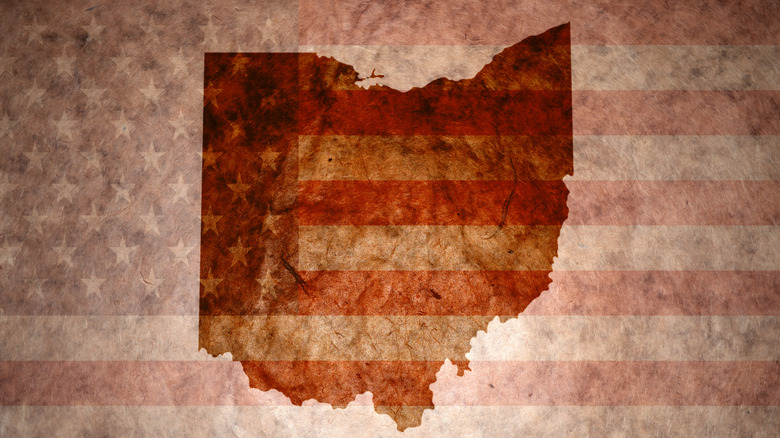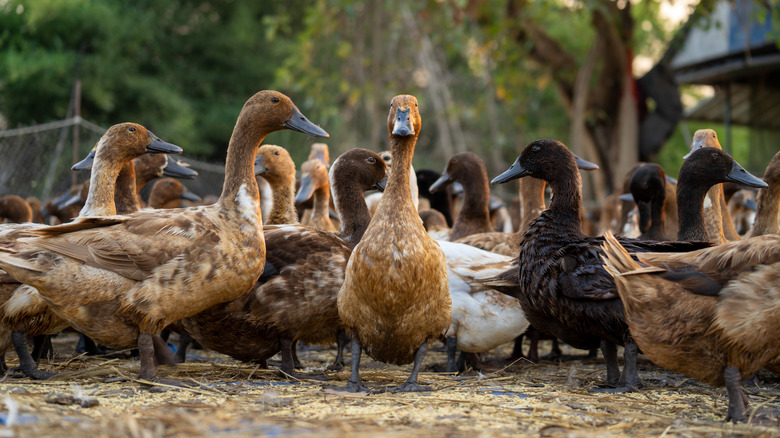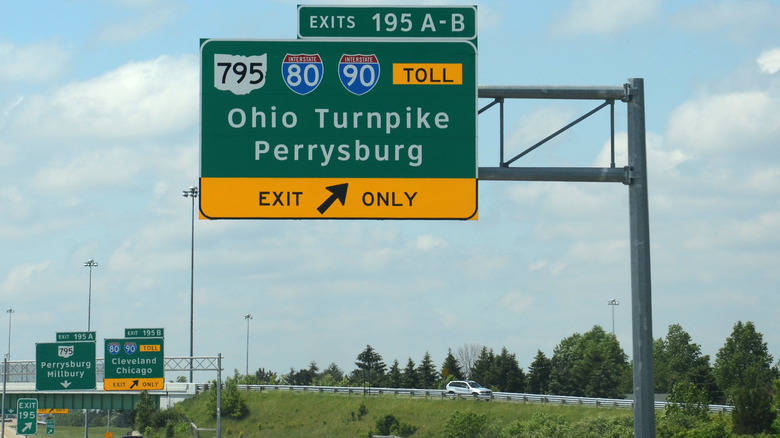Weirdest Laws In Ohio
Ohio, also known as "The Buckeye State," became the country's 17th state on March 1, 1803. However, as reported by History, it was not actually made official until 1953, when President Dwight Eisenhower signed the necessary documents.
In addition to being the birthplace or home of seven United States presidents, Ohio is known for having the nation's first ambulance service, traffic light, professional baseball team, professional city fire department, the first hot dog, the first full-time automobile service station, and the first airplane.
50 States reports some of the most famous and celebrated residents of Ohio include Neil Armstrong, Thomas Edison, John Glenn, Charles Goodyear, Steven Spielberg, and the Wright Brothers, as well as presidents Garfield, Grant, Harding, Harrison, Hayes, McKinley, and Taft.
With an area of 44,825 square miles, Ohio has an estimated 11,563,504 residents. History reports the state got its name from the Iroquois word for "great river." The southern border of the state runs along the Ohio River and the north is bordered by Lake Erie.
50 States reports that in 1852, Ohio became the first state to enact a series of laws designed to protect working women. However, like most other states, Ohio also has a number of laws that are quite unusual. Although many of the unusual laws are archaic, and rarely (if ever) enforced, they remain on the books and do have corresponding penalties, including some hefty fines.
Whales are not allowed in Perrysburg, Ohio
The city of Perrysburg, Ohio, located in Wood County, prohibits residents from keeping, maintaining, or having control over whales. This is specifically unusual as Ohio is more than 500 miles away from the Atlantic Ocean, which is the nearest body of water where a whale could be found.
As stated in the city ordinance, which is provided by Code Library, whales are prohibited within city limits due to their "size, nature, or other characteristics" which would likely cause "a danger to property or to human life if it were to escape from secure quarters."
The ordinance is not limited to whales. The law similarly prohibits the possession of dolphins, porpoises, seals, and sea lions. It also prohibits poisonous or venomous reptiles, including anacondas, Gila monsters, and sea snakes. Perrysburg residents are also prohibited from having alligators or crocodiles, poisonous amphibians, and poisonous fish, including stingrays.
Code Library reports residents of Perrysburg, Ohio, are not allowed to have any bears, large cats, large canines, marsupials (including kangaroos and Tasmanian devils), and hyenas, hippopotamuses, rhinoceroses, sloths, and water buffalos. In addition to having their animals seized, anyone violating these laws will be charged with a minor misdemeanor and could be forced to pay a fine.
Ducks are prohibited from roaming the streets of Glendale, Ohio
The Village of Glendale, Ohio, which is located in Hamilton County, prohibits ducks from roaming free through the village's alleys, lanes, streets, and other public common grounds. As reported by Code Library, the ordinance also prohibits ducks from entering the private property of residents other than the animal's owner.
Glendale's "Foul Running at Large" ordinance similarly prohibits chickens and turkeys from roaming free throughout the village and entering private property where they are not welcome. In a separate ordinance, the village has a law pertaining to asses, cattle, goats, horses, mules, and swine.
Code Library reports the Village of Glendale, Ohio, prohibits residents from harboring insects too, "which by loud and frequent or habitual noise" may "cause serious annoyance to persons in the neighborhood."
To determine whether the insects are causing a "serious annoyance," the courts are tasked with determining what time the insect noise is being heard, the intensity of the insect noise, how long the insects are making the noise, and what type of noises the insects produce. The same ordinance prohibits residents from harboring any other animals, including foul, that make annoying noises and could disturb the peace. Residents violating the animal and insect laws could be charged with a minor misdemeanor and may face fines of up to $100 per day.
Residents of Ohio are not allowed to dye baby chickens or rabbits
According to the Legislative Service Commission, The Ohio Revised Code prohibits individuals, companies, and organizations, from dying or otherwise adding color to the fur or feathers of baby chickens, ducks, or rabbits. The same law also prohibits the sale or distribution of baby chickens, ducks, and rabbits that have had their fur or feathers dyed.
Although the law may seem unusual, coloring baby animals, especially during holiday seasons, is not uncommon, and can lead to a variety of issues. Ohio is one of few states to prohibit the practice.
As reported by Audubon, baby animals are often colored with a non-toxic dye, which is sprayed onto their feathers or fur. However, in some cases, the dye is injected into chicken eggs while the embryo is developing and the chicks are brightly colored when they hatch.
Although the dyes that are used are non-toxic, piercing a hole into an egg can introduce bacteria that could harm or kill the chicks. The other concern is that consumers will be more likely to purchase brightly-colored baby animals impulsively.
The chicks are especially popular around Easter, when parents purchase the brightly-colored baby birds and rabbits for their children. However, Audubon reports families are often unprepared or uninterested in caring for the animals once the novelty wears off. In many cases, the animals are either neglected or surrendered to the Humane Society or other organizations to be rehomed.
Ohio residents must honk their horn before overtaking another vehicle
Ohio has several unusual traffic and vehicle laws, which most people are either unaware of or simply do not take seriously. Although there are penalties associated with the crimes, they are rarely enforced.
Car dealers often provide their customers with temporary license plates, which are attached to the vehicle in a frame displaying the name of the dealer. However, Ohio state law prohibits temporary tags from being displayed with a frame of any kind.
As reported by the Legislative Service Commission, the law explicitly states, "No person shall cover a temporary motor vehicle license registration by any material that obstructs its visibility." The state also prohibits any license plate frames that could obstruct the visibility of permanent license plates.
According to the Ohio Driver License Handbook, while driving in Ohio, it is mandatory to honk your horn to alert other drivers when overtaking another vehicle. As stated in the handbook, "When passing to the left, the law requires that a driver overtaking another vehicle to ... Sound the horn to warn the driver of the vehicle being overtaken that he/she is about to be passed."
As reported by the Legislative Service Commission, failing to provide an audible signal before overtaking another vehicle could result in a misdemeanor charge. Future violations, within one year of the first, could result in harsher charges and penalties.
Coshocton, Ohio, is serious about disorderly conduct
Coshocton, Ohio, which is located in Coshocton County, is very serious about disorderly conduct, especially when that conduct takes place at shopping centers and on school grounds.
As reported by Code Library, residents are prohibited from racing the motor, unnecessarily honking the horn, or suddenly starting or stopping any motor vehicle on school grounds or at shopping centers, as those behaviors may cause a nuisance or disturbance.
Coshocton residents are also prohibited from disparaging any person, or members of a person's family, within the presence of others on school grounds or in shopping centers. As reported by Code Library, the law specifically states residents can not "In the presence or hearing of another person, curse or abuse the person or use any violently abusive language to the person concerning him or her or any of his male or female relatives under circumstances reasonably calculated to provoke a breach of the peace."
Residents are also forbidden from using foul language, yelling or shrieking, or making oral or physically indecent suggestions, in shopping centers and on school grounds. Coshocton also has a curfew for juveniles. Code Library reports those under the age of 11 must be home by 10:00 p.m., those under the age of 16 must be home by 11:00 p.m., and those under the age of 18 must be home by midnight. Code Library reports violators of any of the city's disorderly conduct laws can be charged with a minor misdemeanor and may be forced to pay a fine.





